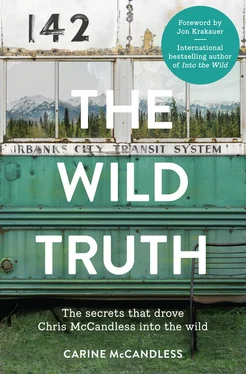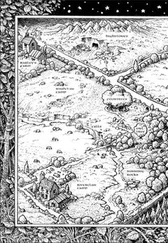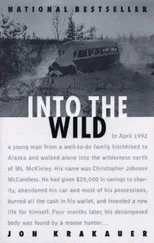At night we would collect rocks to make a fire ring, dry wood to burn, and long twigs for roasting marshmallows for the s’more fixings Mom always carried in her pack. Dad would sing silly, nonsensical songs that made us laugh and tell us about the stars. “Come on, Dad,” I’d say. “With all you know about space, you have to know if there are aliens. Are there? Tell me, please!” Dad would grin mysteriously and dodge the question. “Space is vast, Carine. We’ve only been able to explore a tiny part of it. Maybe they do exist; maybe they don’t. Maybe they live among us and we don’t even know it!”
Later, in our tent, Chris and I would curl up in our hunter-green and navy-blue sleeping bags, the soft linings covered with pictures of mallard ducks. On particularly cold nights we’d zip them together, and Chris would whisper, “Carine! Shhh. Listen . . . I’m pretty sure there’s an alien outside our tent.” Depending on my mood, and on the level of noise in the forest, I would either panic or laugh.
Though the wooded grove shortcut from church was nothing like the Shenandoah, Chris made the most of it. He told me about all the different trees, and we collected leaves that had fallen from each. We looked for the empty shells of the cicadas that had sung to us all summer. The bugs always climbed up the trees before shedding their skin for a new life. We loved to spot their old armor piled up on the ground, no sign of the cicadas in sight.
A FEW WEEKS LATER, Dad went away on business. He was gone for several days and it was like the house’s vibrato changed frequency, lowering until it could barely be felt at all. We made chocolate chip cookies with Mom, and I snuck bites of the dough even though she warned me I’d get worms.
“After the cookies are done baking,” Mom announced, “we’re going to go on a drive and do a little house hunting.”
“What’s house hunting?” I asked.
“We’re going to find a place for the three of us to live.”
“Not Dad?” Chris asked.
“No, not Dad. Just the three of us. I’m going to get us out of here. We shouldn’t have to live like this anymore.”
Chris and I exchanged a wide-eyed look. Finally! we thought, but neither of us dared say it.
“I’ve been to see an attorney,” Mom continued. “I’m going to leave your father.”
Warm cookies in hand, we climbed into the Suburban and drove around town, eager to spot FOR RENT signs in front of smaller houses on streets that were just far enough away. Chris sat in the front, wrote down the phone numbers, and talked about his friends who lived near one place or the other.
“Look, Mom, that one has a swing set!” I pointed.
“That one has a basketball hoop!” Chris said when we passed another.
“Look at that flower bed,” Mom said, shaking her head. “What a travesty. I could put some petunias in there and brighten it right up.” In front of the next house, she said, “I know this one doesn’t look like much, but imagine the potential! All it needs is a fresh coat of paint on the windows, doors, maybe the shutters. It’ll come to life and we’ll have gotten it for a bargain.”
She looked stronger with every mile we traveled. Her eyes and shoulders lifted and her voice had an exhilaration to it as she told us about her meeting with her attorney, Doreen Jones.
When we got home, Chris organized his army men so they’d be easy to pack up, and I organized my stuffed animals. The notepad of rental phone numbers sat next to the phone, with Mom’s notations about whom she’d left a message for. When Dad returned, Mom told him she was divorcing him, that the three of us were moving out. A massive fight ensued, one in which Dad beat Mom down even more with his words than with his hands: “You’re stupid, Billie! You don’t even have a college degree. I can see to it that you can’t get a good job, and there’s no way you can take care of those kids on your own!” He peeled away her strengths until all her insecurities were exposed. Then came the salt in the sugar jar. He gave Mom an expensive token from his trip, and all was forgotten.
The next time Dad left, we went house hunting again. And the time after that. Doreen says this and Doreen says that—Mom would chirp about her most recent meeting with the attorney. With each trip, Chris took less interest in writing down the phone numbers of rentals, until he stopped bringing a notepad altogether.
Occasionally I lost patience with my mom’s unwillingness to leave Dad. I’d pack my little red vinyl suitcase with essentials, like my favorite pajamas and stuffed animals, throw in a couple of Pop-Tarts, and announce I was leaving. I’d get as far as the end of the street before realizing that no one was coming after me. I’d return to the house, but instead of going inside, I would climb into the Suburban and lie down until someone came out to retrieve me. “If I could drive,” I contended, “I’d be out of here.”
Sometimes Mom kept her resolve to divorce Dad longer, and Chris and I were summoned for a sit-down with both parents to discuss important matters. “You each need to say who you want to live with. And we need to know that right now,” they’d say. To answer correctly was impossible. The chosen parent would look smugly at the other in victory, while the odd one out would scream at Chris and me for being so cruel and unappreciative of all that they had sacrificed on our behalf. This summons to appear and decide came frequently, always with the same outcome.
But when we were older and the divorce bomb was launched into the air, we caught it and kept it alive, tossing it around and examining aloud with our parents what a great idea we thought it was, daring them to finally follow through with it and bring the relief of an explosion. All the while, the house hunting continued. In time, Chris and I viewed the drives around town as just that: drives. And when we were old enough to stay home alone, we declined to get in the Suburban at all.
“Okay, kids, I’ll be back soon. I’ve seen some great options over in Mantua. You’ll see!” Mom enthused, though we didn’t really listen.
MY OLDEST SISTER, STACY, always said her life began the day Marcia took her and her siblings away from Walt. They didn’t have much money, and Walt’s child support payments were sometimes inconsistent; with the distance Marcia had gained for herself and her children, Walt could no longer control them, and money was the one weapon he had left against his ex-wife. Marcia contacted authorities three separate times to collect back pay from Walt.
In addition to income from Marcia’s jobs, they relied on church friends and family to help them get by. “Do what you can, with what you have, where you are,” wrote Theodore Roosevelt, and the quote inspired Marcia through the most difficult years. Walt’s parents sent birthday and Christmas presents and back-to-school clothes. Walt and his siblings had come from a volatile home, but with Walt’s musical and academic talents he was regarded as flawless, especially by his mother, Margaret, who reportedly doted on him. But as loyal as she remained to Walt, even she could see that her son had not done right by his first wife.
Marcia’s parents were immensely reliable with their support, helping their daughter and grandchildren both monetarily and beyond. They watched the kids when they weren’t in school while Marcia worked, and they helped care for them when they were sick. It wasn’t an especially easy life, but it was peaceful and loving.
It was sometimes a little uncomfortable when Marcia’s kids would visit us in Virginia, because Chris and I had a lot more material things than they did. We had new skis, new bikes, the latest styles in clothes and shoes, newer models of everything electronic that Marcia’s kids didn’t even have older versions of. We were the ones Dad always provided for. Yet they never complained when it was time to go back home.
Читать дальше






![Theresa Cheung - The Dream Dictionary from A to Z [Revised edition] - The Ultimate A–Z to Interpret the Secrets of Your Dreams](/books/692092/theresa-cheung-the-dream-dictionary-from-a-to-z-r-thumb.webp)





